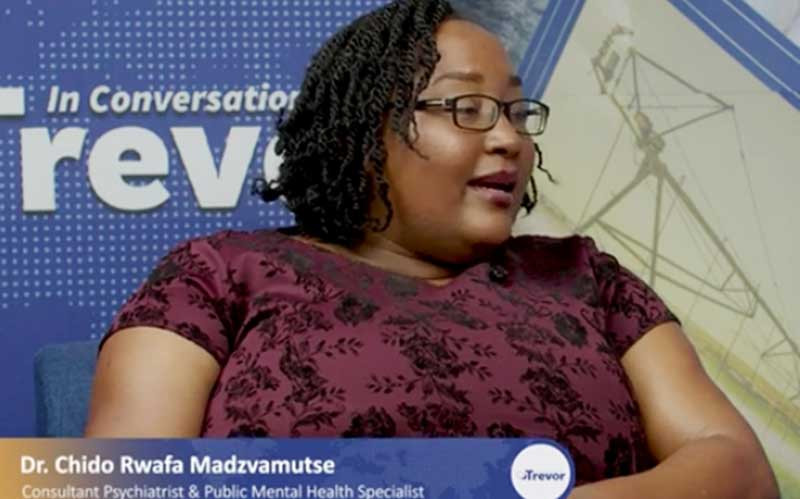
Consultant psychiatrist Chido Ratidzai Rwafa-Madzvamutse said there is need for better understanding of what mental health in order to deal with the problem.
Rwafa-Mdazvamutse (CRM) made the observation in a wide-ranging interview with Alpha Media Holdings chairman Trevor Ncube (TN) on the platform In Conversation with Trevor.
She said, “Mental health is not psychosis, it is not something as dramatic as that all the time.”
Rwafa-Madzvamutse spoke at length about different types of mental health conditions and how to deal with them. Below are extracts from the interview.
TN: Dr. Chido Ratidzai Rwafa-Madzvamutse, welcome to In Conversation With Trevor.
CM: Thank you Trevor. Thank you for the invitation.
TN: Lots of names, shall we go through them?
CM: Yes.
- Masunda lands global sugar industry position
- In Conversation with Trevor: Chisamba: Let’s be proud of ourselves
- In Conversation with Trevor: ‘I tried to change Zanu PF from within’ – Margaret Dongo
- In Conversation with Trevor : How car crash changed my life
Keep Reading
TN: Chido, I understand, why Ratidzai?
CM: Ratidzai was my grandmother’s name, my father's mother.
TN: Rwafa?
CM: Rwafa is my maiden name, so that's where I came from.
TN: Okay.
CM: Then I married into the Madzvamutses.
TN: Wow. I always love getting into those names.
Doctor, you have been in private practice as a consultant psychiatrist since 2016. That is quite a long time.
As I was introducing you here people do not know that I make lots of mistakes, I made a number of mistakes and you say this could be a mental issue.
What were you talking about? What were you saying of my mental state?
CM: Anxiety!
TN: Anxiety? It is anxiety?
CM: Anxiety can happen. Especially when you are on camera, these are things that are common.
Anything that can disturb your ability to reach your full potential, to be productive, to be effective, to make a meaningful contribution, that can be a mental health issue.
TN: So I do have a mental health issue?
CM: Maybe not a diagnosis.
TN: So, the fact that I am under pressure, I am stressed, I am anxious, clearly, I might take this with me home?
I might walk around with it. How do I deal with it?
CM: So, this is where we need a better understanding about what mental health is, mental health is not psychosis, it is not something as dramatic as that all the time.
Many times, the common mental health problems are things like stress and burnout and anxiety and depression.
Those are what we call the common mental health problems.
Yes, sometimes we take our work home with us, sometimes we let the stresses of the world overwhelm us and then yeah, we will be struggling with our mental health.
You may not have a diagnosis of a mental health problem, but it just means that we are struggling with our mental health and we need to learn to acknowledge that.
TN: So in your practice since 2016, what kind of common and uncommon mental health issues are you encountering?
CM: Like I said, the things that are really common particularly in a private setting; stress and burnout.
We see a lot of depression, a lot of anxiety, so this is in contrast with what people imagine when we say mental health or psychiatric.
I worked in government before as a government psychiatrist.
A lot of the times that is a last port of call, the psychiatric unit. So there you would see psychosis.
TN: What is psychosis?
CM: Psychosis is a syndrome. A condition with several symptoms where someone would be struggling with hallucinations, will be struggling with delusions.
So they might be experiencing sensations that other people are not experiencing.
Not to say that that are not real because they are real to them, but you cannot explain them in terms of the context that they will be with.
So they might see and talk to people, you cannot see them, but they are real to that person who is experiencing it and it can be very frightening.
One of my mentors, she is late now Dr Newatiwa, she was really the person who inspired me to join psychiatry.
She used to say psychosis is painful. Imagine if we are sitting here and you think there are people in this room, you are the only one who can see them.
It is actually a painful situation, or maybe you are afraid you are having a delusion that someone wants to kill you let us say.
It is actually a very scary sensation.
TN: It is real to you.
CM: It is real to you.
TN: Everybody else in the room is not experiencing your reality.
CM: Yes. Actually, it is one of the psychiatric emergencies.
There are not many emergencies in psychiatry, I think in terms of this medical discipline.
We are not the ones that get woken up at night a lot, but this is one of them, psychosis is an emergency and it needs to be dealt with.
Not just from a safety point of view, you know safety for the individual safety for others, but in terms of that experience that someone is having that is so frightening and so bewildering.
Dr Newatiwa used to always say it is an emergency, you need to deal with it just like any other form of pain.
TN: The uncommon ones. The uncommon issues that you deal with?
CM: Like I said psychosis actually is one of the more common ones.
There are things like bipolar, I am sure people have heard about it.
It is not as common as, let us say, depression and anxiety.
Childhood mental health problems, many of them are not as common.
There is a list of neurodevelopment things that sometimes we get into, but they are definitely not as common as depression, anxiety and substance abuse.
TN: Describe to us what bipolar is because I think there is a misunderstanding there or complete ignorance.
What is bipolar? How does it manifest itself?
CM: It is a mood disorder that we now know as a neurological disorder, where there are changes in mood that happen over time.
This is not I wake up feeling happy and then by the evening I am feeling sad. It is not that rapid.
These are changes over many months.
Normal human mood is not flat, so we all have you know ups and downs. That is normal actually for life.
TN: So if I get up in the morning and I am energetic and I am lively and I am feeling happy, and by the end of the day I am drained and I am feeling low and slightly depressed...That is normal?
CM: Well it is not normal, but it is not bipolar either.
TN: Okay.
CM: So you could be probably overworked and burnt-out, but not bipolar.
So bipolar is actually quite a serious condition where those mood fluctuations are extreme.
So, where you would feel a bit low for a few hours or a few days, someone with bipolar would be low for months at a time, and quite a deep depression that they would be in.
Then after maybe a season of that sadness then move into a pathological happiness let us say.
It is joy that is a little bit above what we think is normal.
Initially we call it hypomania, then it goes into full-blown mania.
Mania basically is, I would not be sleeping, I do not need to sleep.
I am very energetic, getting lots of things done in the hypomanic phase.
By the time you get to manic phase you are not really getting anything done because you cannot focus on anything.
Then this is the time where delusions might come in, hallucinations might come in, that are linked to the mood.
So I am feeling very happy, so I will be a bit grandiose I will be a bit over the top.
So yes, it is an abnormality, not very common, but when it is there it needs to be treated because it can really affect this ability for someone to be a productive member of society which is the definition of mental health.
So mental health by definition is a state of well-being where you can reach your full potential, you can overcome stress, you can deal with the stress of life, you are working productively and effectively and you are making a meaningful contribution to your family, to your community.
That is actually the definition of mental health, so these conditions, once they start to affect that ability they need to be managed.
Not so that we just have the joy of managing it, no, but for someone to become that person who is reaching their full potential and is contributing to our community.
TN: I want us to zero-in on certain specific conditions. And you walk us through them in terms of when are the red lights.
For instance, I said I come in the morning and I am excited and work.
By the end of the day I am like, you know it has been a long day and I am tired and so forth, I am burnt out.
So then, when should I be worried? I start with stress. Stress in itself is not a bad word.
I think when people say stress they think it is a pathology in and of itself, it is actually not.
CM: Stress is part of life, in fact we need a little bit of stress to get us up in the morning.
TN: Tension?
CM: Yeah. However, stress needs to be managed well.
Also there needs to be an adequate amount of stress that I can manage, that I have got the capacity to manage.
If I have now got stress that is coming at me that I have no capacity to manage anymore, whether it is because there is too much stress or my capacity has been diminished by one reason or another, then I am over-stressed.
Once I am over-stressed we start to get some of these symptoms of irritability and you know you come to work you feel a bit tired, you cannot sleep properly.
Mild symptoms, but it is starting to show that I am not coping very well.
If you continue along that path, so if you do not change anything.
Either you are not changing in terms of building up your own capacity to deal with stress, or not changing the amount of stress coming at you.
You can then then fall into burnout, which is really the result of a lot of stress that has not been managed well for a long time.
Burnout itself is called a workplace syndrome, but I think it can happen even in the home, which is a workplace if you think about it.
There are three major symptoms of burnout.
One is that change in mood. So, you get that irritability.
Just not being able to withstand a lot anymore.
What you could do in the past, you could work an eight, 10, or 12 -hour day. Now all of a sudden by six seven hours you are done.
You are becoming ineffective, that is the other symptom.
What you could do well you are not doing well anymore, so there is that ineffective part of it as well.
Then there is also the change in attitude. The cynicism.
When you find yourself becoming a cynic and becoming negative towards life, towards what you are doing, towards people that you work with as well, those are things to pick up and say something is wrong.
These are very early things.
Burnout is not really a mental health syndrome per se.
It is a lifestyle thing where we address lifestyle issues, but these are early symptoms that you can deal with very early before you then go into deeper issues like depression or anxiety.
TN: I like your demarcation of home and work. What are the work-related mental health issues that we need to be alive to?
And the home-related ones that we need to be alive to?
CM: It is interesting, and which made me think that the home is the workplace as well.
There might not be a very clear distinction here. It is just the human condition and the things that affect human beings where you find yourself working.
Some of the things I think to do with work specifically, obviously burnout is one of them.
I think the World Health Organisation has recognised that; to say sometimes there are factors at the workplace that can then increase the risk of getting burnt out.
Part of it is you know a sense of autonomy, sense of knowing how your day will end.
Jobs where you do not know how the day will end, with no control over your schedule can really increase your risk of burnout.
Where you feel like you do not have much control over what you do.
Sometimes being overworked, it is true, I think that is the more common one.
Also, being underworked is true.
So, you are employed and you are not really sure what you are supposed to be doing.
All of that can lead to burnout interestingly enough, because when you think someone's being underworked they are not working too hard, but it can lead to burnout because you are always thinking about it, and you are thinking maybe I should be doing more.
- “In Conversation With Trevor” is a weekly show broadcast on YouTube.com//InConversationWithTrevor. The conversations are broadcasted to you by Heart and Soul Broadcasting Services










